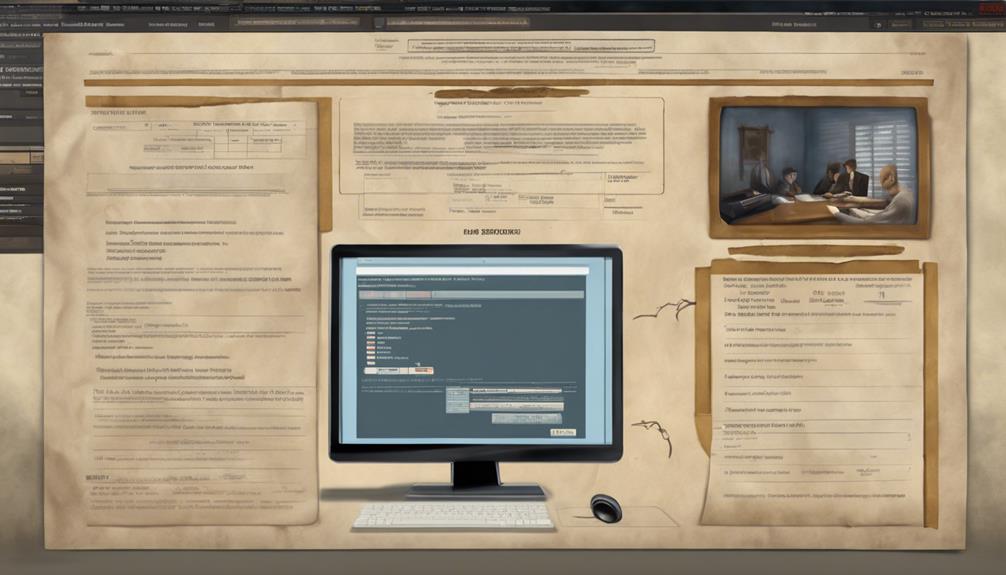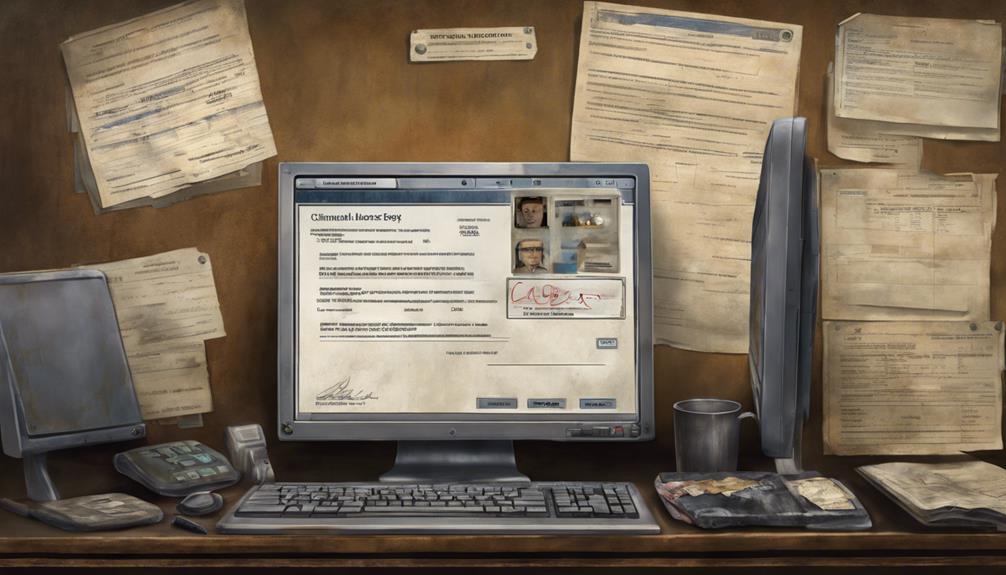Misdemeanors can show up on background checks, affecting job and housing prospects. Visibility depends on the check's depth, laws, and factors like expungement, recency, and severity. Employers consider past misdemeanors during hiring, impacting candidate evaluation. Candidates must disclose misdemeanors during the hiring process. Expungement can remove misdemeanors, improving chances. State laws dictate reporting limits, usually 7-10 years. Background check thoroughness affects misdemeanor discovery. Understanding misdemeanor handling is crucial, influencing life opportunities. For deeper insights into misdemeanor impact, explore further details in the research provided.
Key Takeaways
- Misdemeanors can show up on background checks depending on the depth of the check.
- Visibility varies by jurisdiction, check type, severity, and recency of the misdemeanor.
- Employers may consider misdemeanor convictions in hiring decisions.
- Transparency about misdemeanors during applications is crucial for job prospects.
- Expungement can remove misdemeanors from public view, improving job opportunities.
Understanding Misdemeanors and Background Checks
When conducting background checks, employers must understand how misdemeanors can impact the hiring process. Misdemeanors, such as DUI, petty theft, and disorderly conduct, can appear on criminal records that potential employers review. While misdemeanors are considered lesser crimes than felonies, they can still influence employment opportunities. The visibility of misdemeanors on background checks is influenced by factors like the severity and recency of the offense. Employers often take misdemeanor convictions into account when making hiring decisions, as they may reflect on an individual's character and trustworthiness.
Being transparent about any misdemeanor convictions during the hiring process is essential for prospective employees. By openly discussing any past misdemeanors, individuals can demonstrate honesty and integrity, which are valued traits in the workplace.
Understanding how misdemeanors can impact background checks enables both employers and job seekers to navigate the hiring process more effectively. This knowledge empowers individuals to address any concerns proactively and present themselves in the best light possible.
Scope of Misdemeanor Visibility

Misdemeanors on background checks can vary in visibility depending on the type of check and the jurisdiction's laws.
The impact of misdemeanors on individuals' records can influence their job prospects and legal obligations.
Understanding the legal requirements for disclosing misdemeanor convictions is essential for both employers and individuals managing background check processes.
Misdemeanors on Background Checks
Examining the scope of misdemeanor visibility on background checks reveals varying levels of disclosure based on the depth of the check and jurisdictional factors. Misdemeanors mightn't show on all background checks, especially if they're minor offenses or have been expunged.
However, in many cases, misdemeanors do show on a background check, particularly if the check is thorough or conducted at the county level where misdemeanors are often prosecuted.
The presence of a misdemeanor on a background check can vary depending on how long ago the offense occurred, the severity of the misdemeanor, and whether the individual completed any required penalties, such as probation or community service.
Additionally, factors like the type of job being applied for and the employer's specific background check policies can also influence whether a misdemeanor appears on a background check.
Understanding these nuances is important for individuals seeking employment or facing background checks for other reasons.
Impact of Misdemeanors
The impact of misdemeanors on background checks can greatly influence individuals' opportunities and prospects, particularly in relation to employment and housing considerations.
Misdemeanors, though less severe than felonies, can still show up on background checks, potentially affecting one's criminal record visibility. The extent to which misdemeanors are disclosed depends on the thoroughness of the background check and specific state regulations.
Employers often assess the nature, severity, and recency of misdemeanors when evaluating candidates. Some states limit how far back misdemeanors can be reported, typically within a 7-10 year timeframe.
To navigate the impact of misdemeanors on background checks effectively, individuals should be transparent about any past misdemeanor convictions during the hiring process. By addressing these matters proactively, individuals can clarify any concerns and present themselves in the best light possible to potential employers and landlords.
Legal Disclosure Requirements
When conducting background checks, employers may encounter varying legal disclosure requirements regarding the visibility of misdemeanor convictions. The scope of misdemeanor visibility on background checks is influenced by state laws, the nature of the offense, and the time elapsed since the conviction.
Some states restrict reporting misdemeanors beyond a certain timeframe, typically 7 to 10 years. Employers have the discretion to assess misdemeanor convictions in relation to job requirements.
Transparency regarding criminal convictions during the job application process is essential. Potential employees should be aware that employers may request disclosure of misdemeanor convictions and consider them when evaluating eligibility for employment.
Understanding the legal disclosure requirements surrounding misdemeanor visibility can help both employers and potential employees navigate the hiring process effectively. It's essential for individuals with prior criminal convictions to be forthright in their job applications to comply with legal standards and foster trust with employers.
Impact of Misdemeanors on Employment

Misdemeanors can greatly restrict job opportunities for individuals due to potential employer policies and background check scrutiny. When employers conduct criminal background checks, a misdemeanor will show up, impacting the hiring process.
The severity and timing of the offense play a significant role in how employers perceive the candidate. Some industries, like healthcare or finance, may have stricter background check requirements concerning misdemeanors due to the sensitive nature of the work.
It's essential for job seekers to be transparent about their misdemeanor convictions during the application process. Being honest about past offenses allows candidates to address any concerns upfront and demonstrate their commitment to rehabilitation.
Job seekers with misdemeanor convictions should be prepared to discuss their past mistakes, show remorse, and highlight the positive changes they've made. By approaching the topic with honesty and accountability, individuals with misdemeanors can increase their chances of securing employment despite their past indiscretions.
Disclosure of Misdemeanors in Hiring Process

Employers often ask about misdemeanor convictions during the hiring process.
Candidates should be forthcoming about any misdemeanors they've on their record.
The nature and timing of the misdemeanor can influence the employer's decision-making process.
Misdemeanor Disclosure Requirements
During the hiring process, job candidates are typically required to disclose any misdemeanor convictions they may have. Employers often include questions about criminal history, including misdemeanors, on job applications or during interviews. It's essential for candidates to be honest about their misdemeanor convictions as failure to disclose this information can impact their job prospects negatively.
While some states have laws that restrict when employers can ask about misdemeanor convictions, candidates should still be prepared to discuss any past criminal history. Understanding the specific misdemeanor disclosure requirements in the state where the job is located is vital for both employers and job seekers.
Being transparent about misdemeanor convictions not only demonstrates integrity but also allows employers to assess the candidate's suitability for the position.
Employer Considerations for Misdemeanors
When evaluating job candidates, careful consideration of any disclosed misdemeanor convictions plays an essential role in the hiring process. Employers often inquire about misdemeanor convictions on job applications or during interviews to assess an applicant's criminal history. Some states have 'ban the box' laws that postpone questions about misdemeanors until later stages of the hiring process. Employers weigh factors like the age, nature, and relevance of the misdemeanor to the job when making employment decisions. Transparency and honesty regarding misdemeanor convictions can establish trust with employers during the hiring process. Misdemeanors appearing on background checks may significantly impact employment decisions, particularly for positions involving trust, financial responsibilities, or interactions with vulnerable populations.
| Employer Considerations | ||
|---|---|---|
| Factors to Consider | Timing of Inquiry | Importance of Disclosure |
| Nature of Misdemeanor | Relevance to Job | Building Trust with Employers |
Impact of Misdemeanors on Hiring
The revelation of misdemeanor convictions in the hiring process can greatly impact employers' perceptions of a candidate's suitability for a role. Employers often inquire about criminal history, including misdemeanor convictions, to assess a candidate's honesty and integrity.
Transparently disclosing misdemeanor convictions demonstrates accountability and can positively influence hiring decisions, showcasing a candidate's willingness to take responsibility for past actions. It's important to note that some states have restrictions on employers considering certain misdemeanor convictions that are unrelated to the job requirements.
The impact of a misdemeanor on hiring decisions depends on various factors such as the nature of the offense, how recent it was, and the candidate's overall qualifications. Candidates with misdemeanor convictions should be prepared to discuss their past mistakes, efforts towards rehabilitation, and preventive measures taken to assure potential employers of their suitability for the role.
Being forthcoming about misdemeanor convictions and addressing concerns during the hiring process can help candidates navigate this aspect of background checks effectively.
Removing Misdemeanors From Records

It's essential to emphasize that individuals with misdemeanors on their records can explore legal avenues such as expungement or sealing to remove these offenses from public view.
Expungement involves erasing the conviction as if it never occurred, while sealing restricts access to the criminal record. The eligibility criteria and procedures for removing misdemeanors vary by state and the nature of the offense.
By expunging a misdemeanor, individuals can enhance their job prospects by presenting a cleaner criminal record to potential employers. Consulting with an attorney experienced in criminal law can help individuals navigate the process and understand their options for clearing their records.
It's worth noting that the rules regarding expungement and sealing differ across states, so seeking professional legal advice tailored to the specific circumstances is crucial for those looking to remove misdemeanors from their records effectively.
State Regulations on Misdemeanor Reporting

Understanding the landscape of misdemeanor reporting on background checks requires a clear grasp of state regulations governing the disclosure of such offenses. States like California, Kansas, and New York have specific laws limiting the visibility of misdemeanor convictions after a certain period, typically ranging from 7 to 10 years. These regulations dictate how long misdemeanors can be reported on background checks and vary based on the type of background check conducted.
It's essential for individuals maneuvering through the employment process to be aware of state rules on misdemeanor reporting to guarantee compliance with the law. Both employers and job applicants must adhere to these regulations regarding the disclosure of misdemeanor convictions to maintain legal compliance.
Frequency of Misdemeanor Appearance

Misdemeanors may surface on background checks, depending on the thoroughness and jurisdiction of the check. The frequency of misdemeanor appearance on background checks can vary based on the type of background check conducted.
For example, pre-employment background checks tend to reveal misdemeanors since employers seek detailed information about potential hires. Misdemeanors, unlike felonies, are more likely to appear on background checks due to their nature as lesser offenses. These checks typically cover a span of seven years, capturing recent misdemeanor convictions.
It's essential for individuals to be aware of the types of background checks being conducted, as this can impact the visibility of misdemeanor records. Understanding the prevalence of misdemeanors on background checks is important for both employers and job seekers to navigate the hiring process effectively.
Addressing Misdemeanors in Background Checks

When evaluating misdemeanor records on background checks, employers often take into consideration the nature and recency of the offenses. The type of background check conducted can also influence how misdemeanors are viewed in the hiring process.
A candidate's criminal history, including any misdemeanor charges, is a vital factor for employers to assess. Please be aware that some states prohibit the reporting of certain misdemeanor convictions after a designated period, ensuring that individuals aren't unfairly penalized for past mistakes.
Being transparent about misdemeanor convictions during job applications can help build trust with employers and demonstrate a willingness to take responsibility for past actions.
Understanding how misdemeanors are addressed in background checks is essential for individuals seeking employment or housing, as these records can have a significant impact on opportunities in various aspects of life.
Final Considerations for Misdemeanors

Employers often weigh the potential impact of misdemeanor convictions on job candidates before making final hiring decisions. While misdemeanors are generally less serious than felonies, they can still have implications for an individual's criminal history and job prospects. The consideration of misdemeanors during the hiring process can depend on the type of offense, its severity, and how recent it was.
Candidates with misdemeanor convictions should be aware that some employers may overlook older or less severe offenses, especially if the candidate demonstrates rehabilitation and good conduct since the incident. Additionally, if a misdemeanor has been sealed or expunged from the individual's record, it may not appear on a standard background check, reducing the likelihood of it affecting job opportunities.
It is essential for job seekers with misdemeanor convictions to be transparent about their criminal history during the hiring process. By being upfront about past offenses and showing how they've grown from those experiences, candidates can present themselves in the best light to potential employers.
Frequently Asked Questions
How Long Do Misdemeanors Stay on Your Record in Pa?
Misdemeanors in Pennsylvania typically remain on one's record for life. The state requires a petition for expungement as it does not automatically clear misdemeanors. Some offenses may qualify for sealing after a waiting period.
How Long Do Misdemeanors Stay on Your Record in Ny?
In New York, misdemeanors can stay on record indefinitely, as the state lacks a specific time limit for their presence. Employers may consider misdemeanor convictions regardless of when they occurred, emphasizing the importance of legal disclosure.
How Long Do Misdemeanors Stay on Your Record in Wisconsin?
Misdemeanors in Wisconsin remain on your record indefinitely, as the state lacks a statute of limitations for such offenses. Background checks in Wisconsin can disclose misdemeanors, including convictions and pending charges, at any time.
How Long Do Misdemeanors Stay on Your Record in Michigan?
Misdemeanors typically stay on one's record in Michigan for life, unless expunged. Understanding Michigan's laws on misdemeanor convictions and expungement is essential for individuals as these offenses can impact various aspects of their lives.
How Long Does a Class C Misdemeanor Stay on Your Record in Texas?
In Texas, Class C misdemeanors linger indefinitely on records, leaving a lasting mark. Whether dismissed or not, these minor offenses, from speeding tickets to disorderly conduct, can influence one's legal standing and job prospects.
What Kind of Offenses Can Show Up on Background Checks?
Background checks can reveal various offenses, such as criminal convictions, driving violations, and financial issues. Additionally, some employers may include education verification in their background checks, looking for a high school diploma background checks. It’s important to be honest about your past and be prepared to discuss any potential red flags.
Conclusion
To sum up, misdemeanors can appear on background checks, potentially affecting employment opportunities. Like a small bump in the road, they may not be insurmountable obstacles, but it's important to understand their implications and consider steps to address them.
By staying informed, being transparent, and following state regulations, individuals can navigate the process effectively and work towards achieving their goals.









